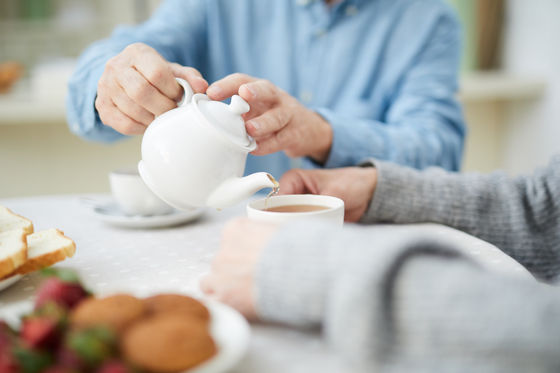It turns out that people who drink coffee and tea often have a high survival rate ``after a heart attack or stroke''

Previous studies have shown that
Green Tea and Coffee Consumption and All-Cause Mortality Among Persons With and Without Stroke or Myocardial Infarction | Stroke
https://www.ahajournals.org/doi/10.1161/STROKEAHA.120.032273
Green tea, coffee linked to lower death risk after stroke, heart attack | American Heart Association
https://www.heart.org/en/news/2021/02/04/green-tea-coffee-linked-to-lower-death-risk-after-stroke-heart-attack
Drinking green tea, coffee lowers risk of death for stroke and heart attack survivors | American Heart Association
https://newsroom.heart.org/news/drinking-green-tea-coffee-lowers-risk-of-death-for-stroke-and-heart-attack-survivors
This time, a research team led by ProfessorHiroyasu Iso of the Department of Social Medicine, Osaka University Graduate School of Medicine, found that green tea and coffee reduce the risk of death in people who have recovered from heart attacks and strokes. In their paper, the research team said, ``While drinking green tea, the most common drink in Asia and the world-famous coffee, has been shown to reduce the risk of death in healthy people, it has been shown to decrease survival from heart attacks and strokes. There are no studies that have looked at the effects on people,' he said. He said that due to advances in medicine and an aging population, more and more people are continuing to live after having suffered a heart attack or stroke, so there is a growing need for research that focuses on the relationship between these people and drinking. rice field.

Therefore, the research team selected 46,213 people from the `` Study
After the survey was completed, the lifestyle habits of the 9,253 people who died during the survey period and those of the others were analyzed using the Cox proportional hazards model , a statistical method that investigates what factors affect survival time. Green tea was found to reduce overall mortality risk in stroke and myocardial infarction survivors.
Specifically, those who drank 1-2 cups of green tea daily had a 35% higher risk of death than those who did not, 44% for 3-4, 48% for 5-6, and 62 for 7 or more cups. % has also decreased. One cup of green tea is defined as about 100ml, so seven cups of green tea is equivalent to about three 250ml plastic bottles. A similar effect in reducing the risk of death was seen in myocardial infarction survivors, but not in those without a history of stroke or myocardial infarction.
Coffee was associated with a lower risk of death in myocardial infarction survivors, with one cup per day being 22% and two or more cups per day being 39%. This effect was also seen in people without a history of stroke, but there was no association between mortality risk and coffee drinking habits in stroke survivors. A cup of coffee was defined as approximately 150ml.

In addition to the above, the current study also found that ``the more frequently you drink green tea, the lower the prevalence of diabetes,'' and ``the higher the coffee drinkers, the lower the prevalence of hypertension and diabetes.'' increase.
In the paper, the research team said, ``The mechanism by which green tea affects cardiovascular health is mainly due to the effect of epigallocatechin gallate , which is the most abundant polyphenol in green tea. We also know that drinking brewed coffee is associated with lower serum cholesterol levels and less inflammation in women with diabetes.' However, he also points out that this study has the problem that 'since it is a study that observes the results, it is not possible to conclude a causal relationship between drinking green tea or coffee and health.'
In his presentation at Stroke, Professor Iso said, 'The point of this study is that in Japan, cold-brewed green tea is often drunk, and unlike overseas, no sugar is added. On the other hand, cold coffee is also consumed. But coffee can have milk or sugar, but in any case, the healthiest way to drink green tea or coffee is without sugar.'
Related Posts:







